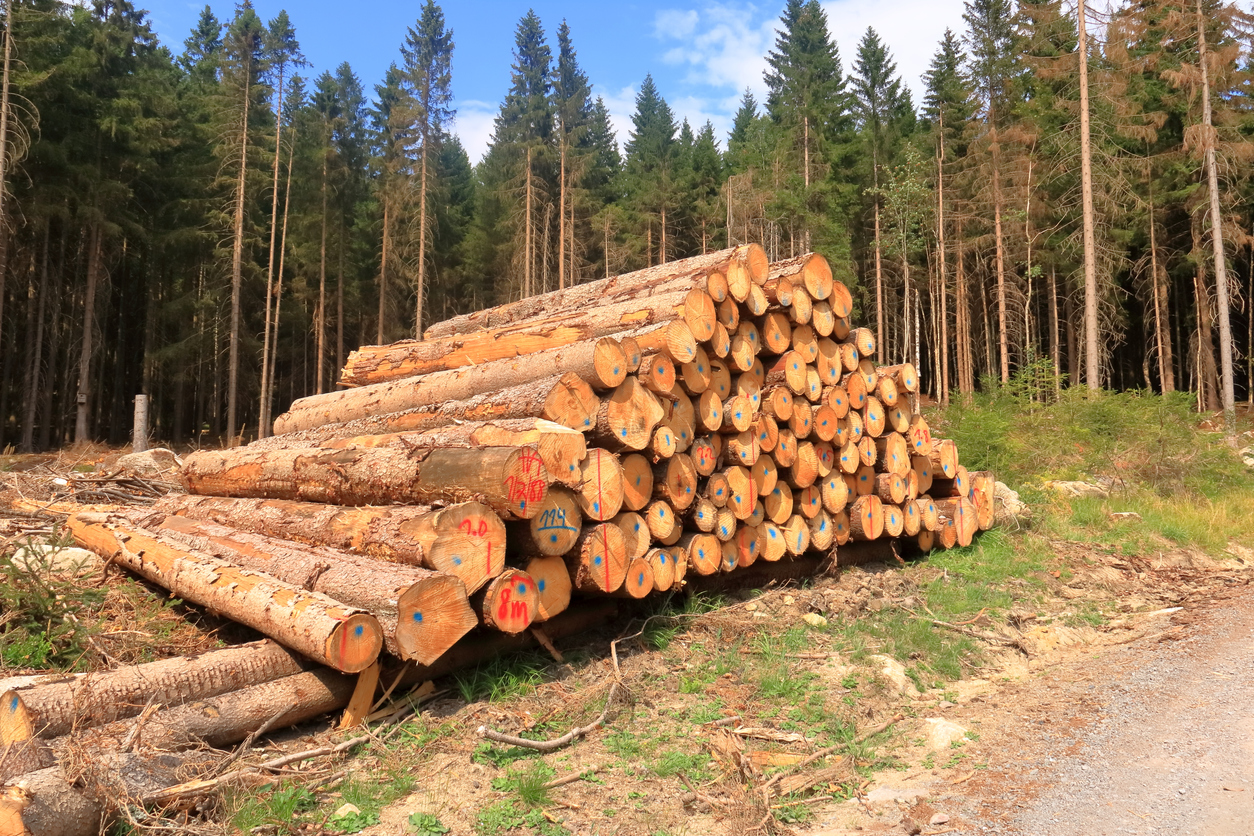Exploring the Lucrative Business Opportunities in Nigerian Logging Industry with Wigmore Trading
Exploring the Lucrative Business Opportunities in Nigerian Logging Industry with Wigmore Trading
Are you tired of the same old business opportunities that seem to be everywhere? Well, we have something exciting and unique for you! In this blog post, we will take you on a journey to explore the lucrative world of the Nigerian logging industry with Wigmore Trading. Get ready to discover untapped potential, sustainable practices, and endless possibilities in one of Nigeria’s most promising sectors. Whether you’re an aspiring entrepreneur or a seasoned investor, this is your chance to delve into a thriving market that promises both financial gain and environmental stewardship. So fasten your seatbelts as we uncover the hidden gems within Nigeria’s logging industry – it’s time for a profitable adventure like no other!
Introduction to the Nigerian Logging Industry
Introduction to the Nigerian Logging Industry
The logging industry in Nigeria has been a significant contributor to the country’s economy for many years. It is a vital sector that provides employment opportunities, raw materials for various industries, and contributes to the country’s revenue through exports. In this section, we will provide an introduction to the Nigerian logging industry, including its history, current state, and future potential.
History of the Logging Industry in Nigeria
Logging has been a traditional practice in Nigeria for centuries. The earliest records of timber exploitation date back to the 16th century when European merchants began trading with local communities for hardwoods such as mahogany and teak. During colonial rule, the British government actively promoted logging activities in Nigeria to meet their demand for timber and other forest products.
In post-independence Nigeria, the logging industry continued to grow as more companies entered the market. However, mismanagement of forest reserves and unsustainable practices led to deforestation and environmental degradation. This prompted the government to implement stricter regulations on logging activities.
Current State of the Logging Industry
Currently, there are over 100 registered logging companies operating in Nigeria. The industry employs thousands of people directly and indirectly through activities such as transportation and processing of timber. The majority of these companies are small-scale operations with limited resources.
The main types of timber harvested in Nigeria include hardwoods like mahogany, teak, iroko, sapele, ebony, among others. Softwoods such as pine and spruce are also grown on plantations specifically for commercial use.
Challenges Facing the Logging Industry
Despite its contributions to economic development in Nigeria, there are several challenges facing the logging industry that need urgent attention. One major challenge is illegal logging practices that continue to deplete forest reserves at an alarming rate. This not only affects biodiversity but also leads to loss of livelihoods for many communities dependent on forests.
Overview of Wigmore Trading and their role in the industry
Overview of Wigmore Trading and their role in the industry:
Wigmore Trading is a leading company in the Nigerian logging industry, providing high-quality equipment, machinery, and services to support the growing demand for timber and wood products. The company has been operating for over 10 years and has established itself as a reliable and trusted partner for businesses in the logging sector.
One of the key roles of Wigmore Trading is to provide state-of-the-art equipment and machinery to facilitate efficient logging operations. This includes heavy-duty trucks, cranes, bulldozers, harvesters, chainsaws, and more. These machines are essential for harvesting trees, processing logs, and transporting them to sawmills or other facilities.
In addition to supplying equipment, Wigmore Trading also offers maintenance services to ensure that their clients’ machines are running smoothly at all times. They have a team of experienced technicians who provide regular check-ups and repairs as needed. This helps minimize downtime and keep operations running smoothly.
Another crucial aspect of Wigmore Trading’s role in the industry is sourcing high-quality timber from sustainable forests. The company works closely with local communities and government agencies to ensure that only legally harvested timber is used for their products. This not only supports sustainable forestry practices but also helps combat deforestation in Nigeria.
Furthermore, Wigmore Trading is committed to promoting responsible business practices within the logging industry. They prioritize environmental sustainability by using eco-friendly machinery and implementing ethical sourcing methods. They also collaborate with NGOs to raise awareness about conservation efforts and promote reforestation initiatives.
Apart from supporting sustainable practices within the industry, Wigmore Trading also plays a significant role in boosting Nigeria’s economy. Their business creates job opportunities for locals in both urban areas (through sales offices)and rural areas (through forest management). Additionally, through their partnerships with local suppliers of raw materials such as fuelwood chips used as biomass fuel sources which reduce reliance on traditional non-renewable sources.
Wigmore Trading is a key player in the Nigerian logging industry. Their commitment to providing top-quality equipment and services, promoting sustainability, and contributing to the economy makes them an essential partner for businesses looking to tap into the lucrative opportunities of this sector.
The demand for timber and wood products in Nigeria
Nigeria is a country with a high demand for timber and wood products due to its rapidly growing population and expanding economy. The construction industry, furniture manufacturing, and paper production are the main drivers of this demand. In recent years, there has been a significant increase in the use of timber for energy production as well.
One of the main reasons for this high demand is Nigeria’s large population, which currently stands at over 200 million people. With an estimated annual growth rate of 2.6%, there is a constant need for housing and infrastructure development to meet the needs of the growing population. This has led to a surge in demand for timber as it is one of the primary materials used in construction.
Additionally, Nigeria’s economy has been experiencing steady growth in various sectors such as agriculture, manufacturing, and oil production. This growth has resulted in increased disposable income among Nigerians, leading to a rise in consumer spending on luxury items like furniture made from quality wood.
The furniture industry alone accounts for about 20% of timber consumption in Nigeria. It is estimated that around $1 billion worth of furniture is imported into the country annually due to limited domestic production capacity. This presents a huge opportunity for local investors to tap into this market by setting up furniture manufacturing businesses using locally sourced timber.
Another factor driving the demand for timber and wood products in Nigeria is paper production. Despite advancements in digital technology, paper remains an essential commodity used in offices, schools, packaging industries, etc., making it another lucrative market within the logging industry.
Furthermore, with increasing efforts towards sustainable energy sources globally and locally through initiatives such as bioenergy policies by Nigerian government agencies like Rural Electrification Agency (REA), there has been an increase in the use of wood chips and sawdust as biomass fuel for power generation plants across the country.
Nigeria’s rapidly growing population and economy have created a high demand for timber and wood products in various industries, presenting numerous business opportunities for potential investors. With the right knowledge and resources, the Nigerian logging industry can be a highly lucrative venture with diverse revenue streams. Wigmore Trading is well-positioned to facilitate this growth by providing access to quality timber and wood products for both local and international markets.
Challenges facing the logging industry in Nigeria
The logging industry in Nigeria has been facing numerous challenges in recent years, hindering its growth and potential for profitability. These challenges range from environmental concerns to regulatory issues and economic factors. In this section, we will discuss the main challenges facing the logging industry in Nigeria and their impact on the business opportunities available.
One of the major challenges faced by the logging industry in Nigeria is deforestation. The high demand for timber and other forest products has resulted in unsustainable logging practices, leading to a rapid depletion of forests. This not only affects the environment but also poses a threat to local communities that rely on these forests for their livelihoods. As a result, there has been increased government scrutiny and regulations on logging activities, making it difficult for businesses to obtain necessary permits and licenses.
Another challenge faced by the logging industry is illegal logging activities. Despite efforts by government agencies to combat this issue, illegal loggers continue to operate with impunity, causing significant damage to natural habitats and wildlife. This not only threatens the sustainability of forests but also undermines legitimate businesses within the industry.
Furthermore, inadequate infrastructure presents a major challenge for companies involved in logging operations. Poor road networks make it challenging to transport logs from remote locations to processing plants or ports for exportation. This results in higher transportation costs and delays which ultimately affect overall profitability.
The lack of modern technology and equipment is also a significant challenge facing the Nigerian logging industry. Most companies still rely on traditional methods of harvesting trees such as manual felling, which is time-consuming and inefficient compared to mechanized processes used in other countries. Additionally, outdated machinery leads to low productivity levels, impacting profitability negatively.
Moreover, fluctuations in global market demand have significantly affected prices of timber products resulting from oversupply or undersupply situations caused by external factors such as weather conditions or changes in trade policies of importing countries.
Corruption remains a prevalent issue within the Nigerian forestry sector that hinders growth opportunities for legitimate businesses. Bribery and other forms of corruption often occur during the process of obtaining permits, licenses, and even in the enforcement of regulations. This not only increases operational costs but also creates an unfair playing field for businesses that choose to operate ethically.
Despite these challenges, the Nigerian logging industry still presents lucrative business opportunities for those willing to navigate through them. The government is making efforts to address issues such as illegal logging and deforestation through stricter regulations and initiatives like reforestation programs. Additionally, advancements in technology and equipment are slowly being adopted by some companies, improving efficiency and productivity levels. With the right approach and partnerships with reputable suppliers like Wigmore Trading, businesses can overcome these challenges and tap into the potential profitability of this industry.
– Environmental concerns
One of the major concerns surrounding the Nigerian logging industry is its impact on the environment. Logging, which involves cutting down trees for commercial purposes, has been identified as one of the leading causes of deforestation in Nigeria. This not only contributes to climate change but also affects local ecosystems and communities.
Deforestation and Climate Change:
The loss of forests due to logging leads to a reduction in carbon sequestration, which is essential for mitigating climate change. Trees absorb carbon dioxide from the atmosphere and store it in their biomass. When these trees are cut down, this stored carbon is released into the atmosphere, contributing to global warming. According to a report by Global Forest Watch, Nigeria lost over 400,000 hectares of tree cover between 2001 and 2019 due to agricultural expansion and logging activities.
Impact on Local Ecosystems:
Forests play a crucial role in maintaining biodiversity by providing habitats for various species of plants and animals. The destruction of these habitats through logging can have severe consequences on local ecosystems. Many species rely on specific types of trees or forest conditions for their survival, and when these are removed, they are forced to adapt or face extinction. This disruption can also lead to imbalances within the ecosystem, affecting food chains and other vital ecological processes.
Effects on Indigenous Communities:
Logging activities have also been known to impact indigenous communities who depend on forests for their livelihoods. These communities often have traditional knowledge about sustainable use of resources that can be threatened by large-scale commercial logging operations. Additionally, deforestation may affect water sources and soil fertility that these communities rely on for farming and other subsistence activities.
Efforts towards Sustainable Logging Practices:
Despite these environmental concerns surrounding logging in Nigeria, there have been efforts towards promoting sustainable practices in the industry. The government has implemented policies such as the National Policy on Environment that aim at reducing deforestation rates while promoting reforestation efforts. Various NGOs also work with local communities to raise awareness about sustainable resource management and provide alternative livelihood options.
The Nigerian logging industry presents lucrative business opportunities, but it is essential to consider its environmental impact. By implementing sustainable practices and collaborating with local communities, businesses can ensure that their operations have minimal negative effects on the environment while still being profitable.
– Government regulations
The Nigerian logging industry is a major contributor to the country’s economy, providing employment opportunities and contributing to the GDP. However, like any other industry, it operates within a regulatory framework set by the government. These regulations are put in place to ensure sustainable and responsible management of forest resources while also promoting economic growth.
One of the main governing bodies in charge of regulating the Nigerian logging industry is the Federal Ministry of Environment. This ministry is responsible for enforcing laws and policies related to environmental conservation and protection. It works closely with other agencies such as the Forestry Research Institute of Nigeria (FRIN) and National Environmental Standards and Regulations Enforcement Agency (NESREA) to monitor compliance with regulations in the logging industry.
The primary legislation that governs the Nigerian logging industry is the National Forest Policy Act enacted in 2014. According to this act, all players in the sector must obtain a license from relevant authorities before engaging in any forestry activities such as harvesting or transportation of timber products. The licenses are issued at both federal and state levels, depending on the location of operations.
In addition to obtaining licenses, logging companies are required by law to adhere to strict guidelines on sustainable forest management practices. These include maintaining minimum tree cover percentage in logged areas and implementing reforestation programs after harvesting activities have been completed.
Furthermore, there are regulations that govern specific aspects of logging operations such as road construction within forests, use of chemicals for pest control, waste management procedures, among others. Violation of these regulations can result in severe penalties including fines or suspension of operations.
To ensure adherence to these regulations, regular inspections and audits are conducted by government agencies. Compliance with environmental impact assessment requirements is also mandatory for all new projects within forested areas.
Apart from federal laws, some states may have their own set of regulations governing their respective localities’ logging activities. It is essential for businesses operating in multiple states to familiarize themselves with these local laws to avoid any legal issues.
As the Nigerian logging industry continues to grow and attract investment opportunities, players must comply with all government regulations. Adherence to sustainable forest management practices is crucial not only for the preservation of natural resources but also for long-term profitability in this lucrative sector.
– Infrastructure limitations
Infrastructure limitations are one of the major challenges facing the Nigerian logging industry. Despite the country’s vast forest resources, inadequate infrastructure has hindered the growth and efficiency of this sector.
One of the primary infrastructure limitations in Nigeria is poor road networks. The majority of forest areas are located in remote and inaccessible regions, making it difficult for loggers to transport their harvests to processing facilities or markets. This results in increased transportation costs and delays, negatively impacting the profitability of logging operations.
Moreover, limited access to electricity is another significant challenge facing loggers in Nigeria. Most processing facilities require a reliable power supply to operate effectively, but many rural areas where forests are located lack access to electricity. As a result, loggers have to rely on expensive fuel-powered generators or face disruptions in their operations due to power outages.
The lack of modern equipment and technology is also a major impediment for the Nigerian logging industry. Many loggers still use traditional methods such as manual labor and basic tools like axes and chainsaws for harvesting and processing timber. This not only makes their work more time-consuming but also reduces their productivity and quality of output compared to countries with advanced machinery.
In addition, there is a shortage of skilled labor in the Nigerian logging industry due to limited training opportunities. This leads to low-quality workmanship and poses safety risks for workers who lack proper training on handling heavy machinery or operating equipment.
Another critical infrastructure limitation that affects the Nigerian logging industry is inadequate storage facilities. Due to favorable climatic conditions, wood can easily deteriorate if not stored properly, leading to huge losses for loggers. However, most storage facilities available are poorly constructed or lack essential features like temperature control systems, which further worsens this problem.
Furthermore, despite efforts by government agencies such as National Forest Service (NFS) towards sustainable forest management practices through policies and regulations enforcement; illegal activities such as poaching continue unabatedly due partly infrastructural limitations. The lack of surveillance equipment and monitoring systems in the forest areas hinders the NFS from effectively tracking and stopping illegal logging activities.
Infrastructure limitations pose a significant challenge to the Nigerian logging industry, hindering its growth and profitability. Addressing these issues through strategic investments in road networks, power supply, modern equipment and technology, and training programs can help unlock the full potential of this lucrative business sector.
How Wigmore Trading is addressing these challenges
Wigmore Trading is a leading company in the Nigerian logging industry that has been proactively addressing the challenges faced by businesses in this sector. In recent years, the Nigerian logging industry has witnessed significant growth and demand due to increasing construction and infrastructure projects in the country. However, with this growth also comes various challenges that can hinder the success of businesses operating in this industry. In this section, we will discuss how Wigmore Trading is tackling these challenges and ensuring sustainable growth for itself and its clients.
One of the major challenges faced by businesses in the Nigerian logging industry is deforestation. According to reports, Nigeria has one of the highest rates of deforestation in Africa, which poses a threat to biodiversity and affects climate change. To address this issue, Wigmore Trading has implemented strict sustainable forestry practices. The company ensures that all trees cut down for timber are replanted at an equal or higher rate to maintain a balance between supply and demand. This not only contributes to preserving Nigeria’s forests but also ensures a continuous supply of raw materials for its operations.
Another challenge facing businesses in this industry is poor infrastructure. Many areas where logging activities take place lack proper roads and transportation facilities, making it difficult to transport logs from remote locations to processing plants or ports for export. To overcome this hurdle, Wigmore Trading has invested heavily in building its own transportation fleet equipped with modern vehicles and machinery suitable for navigating through rough terrain. This not only streamlines their operation but also reduces costs associated with outsourcing transportation services.
The lack of government support is another obstacle faced by companies operating in the Nigerian logging industry. Due to inadequate policies or enforcement measures, illegal logging still occurs despite efforts from legitimate businesses like Wigmore Trading. To tackle this issue head-on, the company works closely with local authorities and communities as part of its corporate social responsibility initiatives. It educates local communities on sustainable forestry practices while providing employment opportunities for them through its operations.
Wigmore Trading understands the importance of technology and innovation in driving business growth. With the advent of new technologies, logging processes have become more efficient, safer, and more environmentally friendly. As a result, the company regularly invests in advanced machinery and equipment to enhance its operations and stay ahead of competitors.
Wigmore Trading is committed to addressing and overcoming the challenges that businesses face in the Nigerian logging industry. Its sustainable practices, investment in infrastructure and technology, and collaboration with local communities demonstrate its dedication to promoting responsible logging while driving profitable growth for itself and its clients.
Opportunities for entrepreneurs in the Nigerian logging industry
The Nigerian logging industry has been a significant contributor to the country’s economy for decades, and it continues to hold great potential for entrepreneurs looking to enter the market. With an estimated annual revenue of over $200 million, the sector offers various business opportunities that can lead to substantial profits.
One of the primary reasons why the logging industry in Nigeria is so lucrative is due to the abundance of natural resources in the country. Nigeria boasts vast forests covering about 10% of its land area, making it one of Africa’s leading producers of timber products. The demand for these timber products, both locally and internationally, remains high, presenting a golden opportunity for entrepreneurs to tap into this market.
Furthermore, recent government policies have made it easier for local businesses to participate in logging activities previously dominated by large corporations. With stricter regulations on illegal logging and more incentives given to small-scale operators, there are now more opportunities available for entrepreneurs looking to start their own logging businesses.
One such opportunity is setting up a sawmill. A sawmill is a facility where logs are processed into lumber or planks used in construction and furniture-making industries. As Nigeria continues its rapid urbanization and development projects increase nationwide, there is a growing demand for timber products like planks and boards. Entrepreneurs who invest in establishing sawmills can capitalize on this market demand while also creating employment opportunities within their communities.
Another promising avenue for entrepreneurs is exporting timber products from Nigeria. The global demand for wood products such as furniture, flooring materials, and paper remains strong despite economic downturns in other sectors. This presents an excellent opportunity for Nigerian entrepreneurs who can take advantage of lower production costs compared to other countries and export top-quality timber products at competitive prices.
Additionally, with sustainable practices gaining more attention worldwide, there has been an increased demand for eco-friendly building materials like bamboo. Bamboo grows abundantly in Nigeria’s tropical climate and has numerous applications ranging from construction material to household items. Entrepreneurs can tap into this market by establishing bamboo plantations, processing facilities, and selling finished products locally or internationally.
The Nigerian logging industry offers a variety of business opportunities for entrepreneurs to explore. With the right knowledge, resources, and determination, one can establish a profitable business in sawmilling, exporting timber products, or even producing bamboo-based goods. As Nigeria continues to develop and industrialize, the demand for timber products will only increase, making it an ideal time for entrepreneurs to invest in this lucrative sector.
– Timber harvesting and sales
Timber harvesting and sales are crucial components of the Nigerian logging industry, contributing significantly to its overall success. As one of the largest producers of timber in Africa, Nigeria has a vast forest cover that provides a steady stream of high-quality logs for both domestic and international markets.
In recent years, there has been a surge in demand for timber products due to increased construction activities and the growing furniture industry. This presents a lucrative business opportunity for individuals or companies looking to invest in the Nigerian logging industry through Wigmore Trading.
The process of timber harvesting in Nigeria follows strict guidelines set by the government to ensure sustainable practices and prevent deforestation. These guidelines include obtaining licenses from relevant authorities, adhering to specific logging quotas, and implementing proper reforestation measures.
Wigmore Trading ensures compliance with these regulations by working closely with licensed contractors who have years of experience in sustainable forestry practices. Through this partnership, we can guarantee a consistent supply of high-quality logs while also protecting the environment.
Once harvested, the logs are transported to our sawmills where they undergo several processes before being sold as finished products. We have state-of-the-art machinery and skilled workers who efficiently convert raw logs into various wood products such as planks, boards, beams, and veneers.
At Wigmore Trading, we pride ourselves on producing top-notch timber products that meet international standards. Our strict quality control measures ensure that only premium-grade lumber is sold to our customers. This has earned us an excellent reputation in both local and international markets.
Our extensive network allows us to sell our timber products not only within Nigeria but also globally. With increasing demand for sustainably sourced timber worldwide, investing in Nigerian timber sales can be highly profitable for interested parties.
Furthermore, Wigmore Trading offers competitive prices for our high-quality timber products making them accessible even for small-scale businesses looking to enter the market. This creates opportunities for entrepreneurs seeking new ventures or those looking to expand their current businesses.
The timber harvesting and sales sector of the Nigerian logging industry presents abundant business opportunities for interested investors. With Wigmore Trading as your partner, you can be assured of a steady supply of high-quality logs and timber products at competitive prices. By investing in this sector, not only will you be contributing to the country’s economy, but also promoting sustainable practices in the forestry industry.
– Production and sale of wood products
The production and sale of wood products is an integral part of the Nigerian logging industry. Nigeria is blessed with abundant natural resources, including vast forests and timber reserves. This has made the production and sale of wood products a lucrative business opportunity for entrepreneurs in the country.
One of the major wood products produced in Nigeria is sawn timber. Sawn timber refers to wood that has been cut into various dimensions using a sawmill or other cutting machinery. This type of wood product is used for construction and furniture making, among other purposes. The demand for sawn timber remains high in both local and international markets, creating a profitable opportunity for businesses involved in its production.
Another popular wood product in Nigeria is plywood. Plywood is made by gluing together layers of thin sheets of wood, known as veneers. It is commonly used in construction, furniture making, packaging, and many other industries. With the increasing demand for affordable yet durable building materials, the production and sale of plywood have become a profitable venture for investors in the Nigerian logging industry.
Apart from these two main products, there are several other wood products that are produced and sold in Nigeria. These include veneer sheets, blockboard, particle board, fiberboard, laminated boards, wooden doors and windows, flooring materials such as parquet tiles and laminates, and many more.
The production process for these wood products involves several stages starting from sourcing logs from sustainably managed forests to processing them into finished goods through various techniques like sawing, chipping or peeling. The final product then undergoes quality checks before being packaged and sold to customers.
Wigmore Trading Company has played a significant role in promoting the production and sale of these diverse range of high-quality Nigerian wood products to both local consumers as well as international buyers across Africa and beyond.
It’s evident that there are vast opportunities available within the Nigerian logging industry through its thriving trade-in wood products. With the right partners and a commitment to sustainable forestry management practices, businesses like Wigmore Trading can continue to drive growth in this sector and provide quality wood products that meet both domestic and international standards.
– Equipment leasing and maintenance services
Equipment leasing and maintenance services play a crucial role in the success of any logging operation. In Nigeria, where the logging industry is rapidly growing, there is a high demand for reliable and efficient equipment to support the harvesting, transportation, and processing of timber. This presents a lucrative opportunity for businesses involved in equipment leasing and maintenance.
One of the main advantages of equipment leasing is that it allows businesses to access necessary equipment without having to make large capital investments. This can be especially beneficial for small or new logging companies who may not have the financial resources to purchase their own machinery. By leasing equipment from reputable companies like Wigmore Trading, businesses can save money on upfront costs while still having access to top-of-the-line tools.
In addition to cost savings, equipment leasing also offers flexibility for businesses in the logging industry. As technology continues to advance at a rapid pace, newer and more advanced machinery becomes available. Leasing allows companies to regularly upgrade their equipment without having to worry about reselling or disposing of outdated machines.
When it comes to maintaining these leased machines, Wigmore Trading has a team of experienced professionals who provide comprehensive maintenance services. Regular maintenance is essential for ensuring that leased equipment operates at its optimal level and minimizes downtime due to breakdowns or malfunctions. Wigmore Trading’s team uses state-of-the-art diagnostic tools and techniques to identify potential issues before they become major problems.
Moreover, by outsourcing equipment maintenance services from Wigmore Trading, logging companies can focus on their core operations without worrying about additional staffing or training requirements. The company’s team consists of highly skilled technicians who are trained in all aspects of machine servicing and repairs. They are also equipped with an extensive inventory of spare parts which ensures quick turnaround times for repairs.
Another benefit of utilizing Wigmore Trading’s maintenance services is that they offer customized solutions tailored specifically for each client’s needs. This includes scheduled routine inspections as well as 24/7 emergency repair services if needed. By partnering with Wigmore Trading, logging businesses can have peace of mind knowing that their equipment is being well-maintained and will be ready to perform at its best when needed.
Equipment leasing and maintenance services are essential components of the Nigerian logging industry. By partnering with a reputable company like Wigmore Trading, businesses can save on costs, access top-of-the-line equipment, and ensure their machinery is properly maintained for maximum efficiency. This presents an excellent opportunity for entrepreneurs looking to tap into the growing logging industry in Nigeria.








Comments are closed.